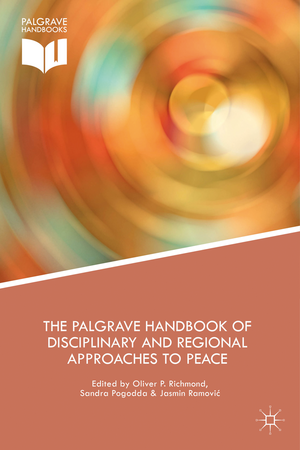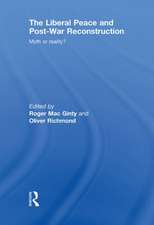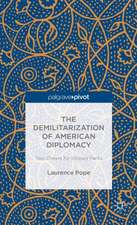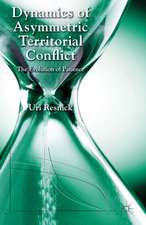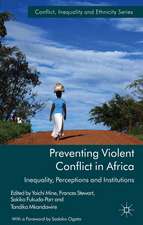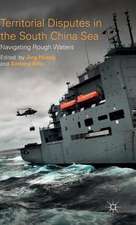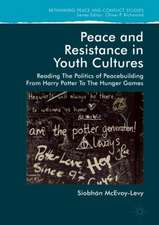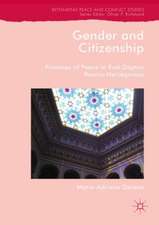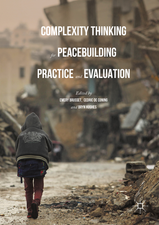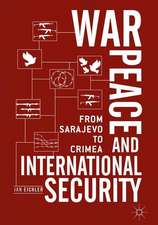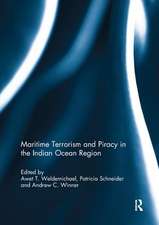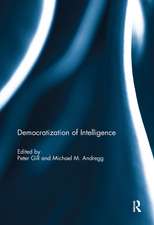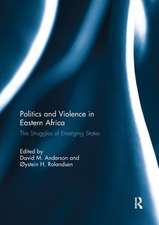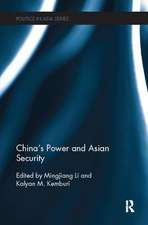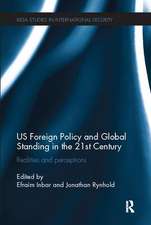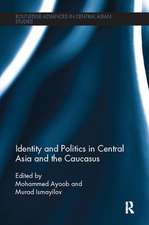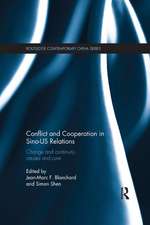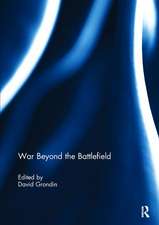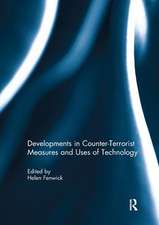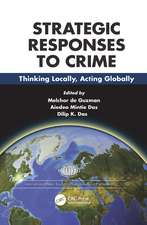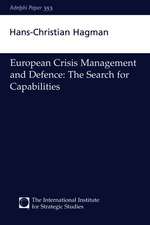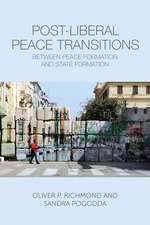The Palgrave Handbook of Disciplinary and Regional Approaches to Peace
Editat de Oliver Richmond, Sandra Pogodda, Jasmin Ramovicen Limba Engleză Hardback – 18 feb 2016
| Toate formatele și edițiile | Preț | Express |
|---|---|---|
| Paperback (1) | 1531.08 lei 6-8 săpt. | |
| Palgrave Macmillan UK – 31 aug 2016 | 1531.08 lei 6-8 săpt. | |
| Hardback (1) | 1376.71 lei 6-8 săpt. | |
| Palgrave Macmillan UK – 18 feb 2016 | 1376.71 lei 6-8 săpt. |
Preț: 1376.71 lei
Preț vechi: 1678.91 lei
-18% Nou
Puncte Express: 2065
Preț estimativ în valută:
263.60€ • 274.48$ • 218.70£
263.60€ • 274.48$ • 218.70£
Carte tipărită la comandă
Livrare economică 14-28 februarie
Preluare comenzi: 021 569.72.76
Specificații
ISBN-13: 9781137407597
ISBN-10: 113740759X
Pagini: 568
Ilustrații: XXII, 568 p.
Dimensiuni: 155 x 235 x 32 mm
Greutate: 1 kg
Ediția:1st ed. 2016
Editura: Palgrave Macmillan UK
Colecția Palgrave Macmillan
Locul publicării:London, United Kingdom
ISBN-10: 113740759X
Pagini: 568
Ilustrații: XXII, 568 p.
Dimensiuni: 155 x 235 x 32 mm
Greutate: 1 kg
Ediția:1st ed. 2016
Editura: Palgrave Macmillan UK
Colecția Palgrave Macmillan
Locul publicării:London, United Kingdom
Descriere
In this handbook, a diverse range of leadingscholars consider the social, cultural, economic, political, and developmentalunderpinnings of peace. This handbook is a much-needed response to the failuresof contemporary peacebuilding missions and narrow disciplinary debates, both ofwhich have outlined the need for more interdisciplinary work in International Relationsand Peace and Conflict studies. Scholars, students, and policymakers are oftendisillusioned with universalist and northern-dominated approaches, and a betterunderstanding of the variations of peace and its building blocks, acrossdifferent regions, is required. Collectively, these chapters promote a moredifferentiated notion of peace, employing comparative analysis to explain howpeace is debated and contested.
Cuprins
PART I: DISCIPLINARY PERSPECTIVES
1. History Peace in History; John Gittings
2. Politics and Governance: From Emergency to Emergence ; David Chandler
3. Philosophy: The Philosophy of Peace; Nick Rengger
4. International Relations: Peace in International Relations Theory; Oliver P. Richmond
5. Anthropology: Implications for Peace; Geneviève Souillac and Douglas P. Fry
6. Arts and Theatre for Peacebuilding; Nilanjana Premaratna and Roland Bleiker
7. Sociology: A Sociological Critique of Liberal Peace; Nicos Trimikliniotis
8. Economics: Neoliberal Peace and the Politics of Social Economics; Brendan Murtagh
9. Geography: Geography and Peace; Nick Megoran, Fiona McConnell and Phillipa Williams
10. Development: Peace and Development Studies; Caroline Hughes
11. Postcolonialism: A Postcolonial Perspective on Peacebuilding; Vivienne Jabri
12. Religion: Peace through Non-Violence in Four Religious Traditions; Caron Gentry
13. Gender: The Missing Piece in the Peace Puzzle; Annika Bjorkdahl and Johanna M. Selimovic
14. Education: Cultural Reproduction, Revolution and Peacebuilding in Conflict-affected Societies; Tejendra Pherali
15. Children: Children and Peace; Ben Collins and Alison Watson
16. Social Psychology: Social Psychology and Peace; Shelley McKeown and Daniel Christie
17. Humanitarianism: Humanitarianism and Peace; Jenny H. Peterson
18. International Law: To End the Scourge of War … and to Build a Just Peace?; Wendy Lambourne
19. Indigeneity and Peace; Morgan Brigg and Polly O. Walker
20. Critical Security Studies: Alternative Dialogues for Peace Reconstructing 'Language Barriers' and 'Talking Points'; Faye Donnelly
PART II: REGIONAL PERSPECTIVES
21. South Africa's Incomplete Peace; Andries Odendaal
22. West Africa: Peace in West Africa; Patrick Tom
23. The Great Lakes Region of Africa; Local Perspectives on Liberal Peacebuilding from the Democratic Republic of Congo ; Josaphat M. Bussy and Carol Gallo
24. The Horn of Africa: Peace in the Horn of Africa; Christopher Clapham
25. Southeast Asia: Peace through Retribution or Reconciliation? Some Insights and Evidence from Southeast Asia; Sorpong Peou
26. East Asia: Understanding the Broken Harmony in Confucian Asia; Ching-Chang Chen
27. South Asia: Human Development and Minority Empowerment – Exploring Regional Perspectives on Peace in South Asia; Florian Krampe and Ashok Swain
28. Emerging Countries: Peace and the Emerging Countries; Kai Michael Kenkel
29. Central Asia Central Asia: Contested Peace; David Lewis
30. Middle East and North Africa: Hegemonic Modes of Pacification in Crisis; Sandra Pogodda
31. Europe: Peace in Europe; Roberto Belloni
32. Balkans; Jasmin Ramovic
33. South America; Peacebuilding in South America: Roddy Brett and Diana Florez
34. Central America: From War to Violence; Jenny Pearce
35. North America: Peace Studies versus the Hegemony of Realist and Liberal Methods; Henry F. Carey
36. Pacific: Peace in the Pacific – Grounded in Local Custom, Adapting to Change; Volker Boege
1. History Peace in History; John Gittings
2. Politics and Governance: From Emergency to Emergence ; David Chandler
3. Philosophy: The Philosophy of Peace; Nick Rengger
4. International Relations: Peace in International Relations Theory; Oliver P. Richmond
5. Anthropology: Implications for Peace; Geneviève Souillac and Douglas P. Fry
6. Arts and Theatre for Peacebuilding; Nilanjana Premaratna and Roland Bleiker
7. Sociology: A Sociological Critique of Liberal Peace; Nicos Trimikliniotis
8. Economics: Neoliberal Peace and the Politics of Social Economics; Brendan Murtagh
9. Geography: Geography and Peace; Nick Megoran, Fiona McConnell and Phillipa Williams
10. Development: Peace and Development Studies; Caroline Hughes
11. Postcolonialism: A Postcolonial Perspective on Peacebuilding; Vivienne Jabri
12. Religion: Peace through Non-Violence in Four Religious Traditions; Caron Gentry
13. Gender: The Missing Piece in the Peace Puzzle; Annika Bjorkdahl and Johanna M. Selimovic
14. Education: Cultural Reproduction, Revolution and Peacebuilding in Conflict-affected Societies; Tejendra Pherali
15. Children: Children and Peace; Ben Collins and Alison Watson
16. Social Psychology: Social Psychology and Peace; Shelley McKeown and Daniel Christie
17. Humanitarianism: Humanitarianism and Peace; Jenny H. Peterson
18. International Law: To End the Scourge of War … and to Build a Just Peace?; Wendy Lambourne
19. Indigeneity and Peace; Morgan Brigg and Polly O. Walker
20. Critical Security Studies: Alternative Dialogues for Peace Reconstructing 'Language Barriers' and 'Talking Points'; Faye Donnelly
PART II: REGIONAL PERSPECTIVES
21. South Africa's Incomplete Peace; Andries Odendaal
22. West Africa: Peace in West Africa; Patrick Tom
23. The Great Lakes Region of Africa; Local Perspectives on Liberal Peacebuilding from the Democratic Republic of Congo ; Josaphat M. Bussy and Carol Gallo
24. The Horn of Africa: Peace in the Horn of Africa; Christopher Clapham
25. Southeast Asia: Peace through Retribution or Reconciliation? Some Insights and Evidence from Southeast Asia; Sorpong Peou
26. East Asia: Understanding the Broken Harmony in Confucian Asia; Ching-Chang Chen
27. South Asia: Human Development and Minority Empowerment – Exploring Regional Perspectives on Peace in South Asia; Florian Krampe and Ashok Swain
28. Emerging Countries: Peace and the Emerging Countries; Kai Michael Kenkel
29. Central Asia Central Asia: Contested Peace; David Lewis
30. Middle East and North Africa: Hegemonic Modes of Pacification in Crisis; Sandra Pogodda
31. Europe: Peace in Europe; Roberto Belloni
32. Balkans; Jasmin Ramovic
33. South America; Peacebuilding in South America: Roddy Brett and Diana Florez
34. Central America: From War to Violence; Jenny Pearce
35. North America: Peace Studies versus the Hegemony of Realist and Liberal Methods; Henry F. Carey
36. Pacific: Peace in the Pacific – Grounded in Local Custom, Adapting to Change; Volker Boege
Notă biografică
Oliver Richmond is a Research Professor in IR and Peace and Conflict Studies in the Humanitarian and Conflict Response Institute at the University of Manchester, UK. He is also International Professor at the College of International Studies, Kyung Hee University, Korea, and a Visiting Professor at the University of Tromso, Norway. He edits the Palgrave book series Rethinking Peace and Conflict Studies, and is co-editor of the journal Peacebuilding.
Sandra Pogodda has worked at the John Hopkins School of Advanced International Studies, USA, the United States Institute of Peace, USA, and at the University of St Andrews, UK, as a Postdoctoral Fellow. In 2013 she became a Lecturer in Peace and Conflict Studies at the Humanitarian and Conflict Response Institute at the University of Manchester, UK.
Jasmin Ramovic is affiliated to the Conflict Response Institute at the University of Manchester, UK. Previously, he has taught undergraduate courses in political science and International Relations. Formerly a UK Government Chevening scholar, he also has extensive experience working with various international organizations, including the United Nations and the European Union missions to Bosnia and Herzegovina.
Sandra Pogodda has worked at the John Hopkins School of Advanced International Studies, USA, the United States Institute of Peace, USA, and at the University of St Andrews, UK, as a Postdoctoral Fellow. In 2013 she became a Lecturer in Peace and Conflict Studies at the Humanitarian and Conflict Response Institute at the University of Manchester, UK.
Jasmin Ramovic is affiliated to the Conflict Response Institute at the University of Manchester, UK. Previously, he has taught undergraduate courses in political science and International Relations. Formerly a UK Government Chevening scholar, he also has extensive experience working with various international organizations, including the United Nations and the European Union missions to Bosnia and Herzegovina.
Textul de pe ultima copertă
In this handbook, a diverse range of leading scholars consider the social, cultural, economic, political, and developmental underpinnings of peace. This handbook is a much-needed response to the failures of contemporary peacebuilding missions and narrow disciplinary debates, both of which have outlined the need for more interdisciplinary work in International Relations and Peace and Conflict studies. Scholars, students, and policymakers are often disillusioned with universalist and northern-dominated approaches, and a better understanding of the variations of peace and its building blocks, across different regions, is required. Collectively, these chapters promote a more differentiated notion of peace, employing comparative analysis to explain how peace is debated and contested.
